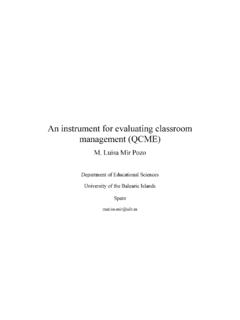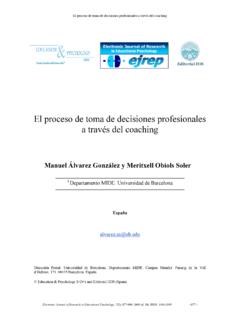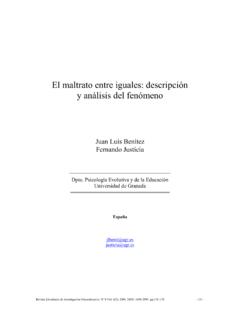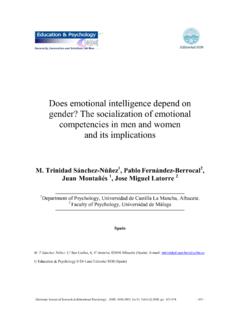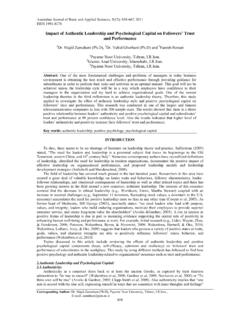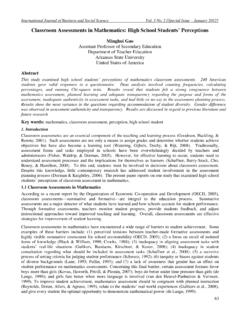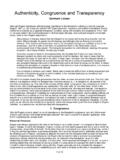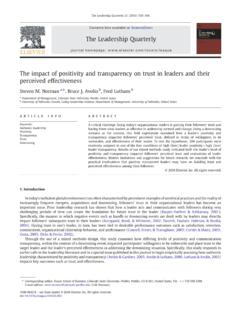Transcription of Predicting Students’ Academic Achieve- ment: Contributions ...
1 Predicting students Academic achievement: Contributions of perceptions of classroom assessment tasks and moti-vated learning strategies Electronic Journal of Research in Educational Psychology, 14(3), 515-533. ISSN: 1696-2095. 2016. no. 40 - 515 - Predicting Students Academic Achieve- ment: Contributions of Perceptions of Classroom Assessment Tasks and Motiva-ted Learning Strategies Hussain Alkharusi Department of Psychology, College of Education, Sultan Qaboos Univer-sity, Muscat Sultanate of Oman Correspondence: Dr.
2 Hussain Alkharusi. Box 32 Alkhod, 123, Oman. E-mail: Education & Psychology I+D+i and Ilustre Colegio Oficial de la Psicolog a de Andaluc a Oriental (Spain) Hussain Alkharusi - 516 - Electronic Journal of Research in Educational Psychology, 14(3), 515-533. ISSN: 1696-2095. 2016. no. 40 Abstract Introduction. Students are daily exposed to a variety of assessment tasks in the class-room. It has long been recognized that students perceptions of the assessment tasks may influence student Academic achievement.
3 The present study aimed at Predicting Academic achievement in mathematics from perceptions of the assessment tasks after controlling for gender and motivated learning strategies. Method. The participants were 232 students enrolled in grade 11 mathematics clas-ses selected from public schools in Oman. Data were collected using the Motivated Strategies for Learning Questionnaire and Perceptions of Assessment Tasks Inven-tory. Students final grades earned in the subject were obtained from the school admi-nistration at the end of the semester.
4 Results. A hierarchical multiple regression analysis showed that consultation and transparency were significantly related to mathematics achievement after controlling for gender and motivated learning strategies. Discussion. The findings contributed to the existing assessment literature by demons-trating the intersection between classroom assessment and self-regulation of learning and their effects on student achievement. Implications and recommendations for re-search and practice were discussed. Keywords: classroom assessment, assessment tasks, student perceptions, motivatio-nal orientations, self-regulation.
5 Reception: Initial acceptance: Final acceptance: Predicting students Academic achievement: Contributions of perceptions of classroom assessment tasks and moti-vated learning strategies Electronic Journal of Research in Educational Psychology, 14(3), 515-533. ISSN: 1696-2095. 2016. no. 40 - 517 - Resumen Introducci n. Los estudiantes est n expuestos diariamente a una variedad de tareas de evaluaci n en el aula. Desde hace tiempo se ha reconocido que la percepci n de las tareas de evaluaci n de los alumnos pueden influir en el rendimiento acad mico estu-diantil.
6 El presente estudio tiene como objetivo predecir el rendimiento acad mico en matem ticas de la percepci n de las tareas de evaluaci n despu s de controlar por g nero y estrategias de aprendizaje motivados. M todo: Los participantes fueron 232 estudiantes matriculados en las clases de ma-tem ticas de grado 11 seleccionados de las escuelas p blicas en Om n . Los datos fueron recolectados a trav s del Cuestionario de Estrategias Motivacionales y un Inventario de la percepci n de las tareas de evaluaci n en el aula.
7 Las calificaciones finales de los estudiantes obtenidos en el sujeto se obtuvieron de la administraci n de la escuela al final del semestre. Resultados. Un an lisis de regresi n m ltiple jer rquica mostraron que la consulta y la transparencia se relacionaron significativamente con el rendimiento en matem ticas despu s de controlar por las estrategias de g nero y de aprendizaje motivado. Discusi n. Los hallazgos contribuyeron a la literatura de evaluaci n existente me-diante la demostraci n de la intersecci n entre la evaluaci n en el aula y la autorregu-laci n del aprendizaje y sus efectos en el rendimiento estudiantil.
8 Se discuten las im-plicaciones y recomendaciones para la investigaci n y la pr ctica. Palabras Clave: evaluaci n en el aula, tareas de evaluaci n , percepciones de los estudiantes, orientaciones motivacionales , autorregulaci n Recibido: Aceptaci n Inicial: Aceptaci n final: Hussain Alkharusi - 518 - Electronic Journal of Research in Educational Psychology, 14(3), 515-533. ISSN: 1696-2095. 2016. no. 40 Introduction Students are daily exposed to a variety of assessment tasks in the classroom.
9 As might be expected, students develop certain perceptions about the classroom as-sessment tasks which may affect their Academic achievement. The central role of classroom assessment in student Academic achievement has been documented in a host of review studies over the past years (Black & Wiliam, 1998; Crooks, 1988; Har-len & Deakin-Crick, 2003; McMillan & Workman, 1998; Natriello, 1987; Struyven, Dochy, & Janssens, 2003). As noted in these reviews, the relationship between stu-dents perceptions of the classroom assessment tasks and Academic achievement is mediated by students motivational beliefs and learning strategies.
10 For instance, when students perceive an assessment task as being clear and attainable, they are more li-kely to develop high self-efficacy to do the task and employ deep learning strategies which in turn can lead to improved Academic achievement. The present study moves in this direction by addressing the relationship between students perceptions of class-room assessment tasks and Academic achievement. Specifically, the purpose of this study was to test the predictions of a model that explains the impact of perceptions of classroom assessment tasks on Academic achievement for students enrolled in grade 11 mathematics classes in the Sultanate of Oman.

